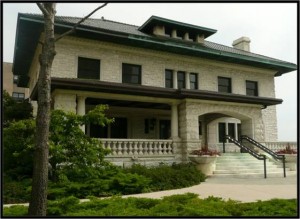The world of archiving, before I came to volunteer at the WLA, was a field that was completely foreign to me. I am a graduate student in poetry, and although there is a certain appreciation and study of the past that come natural in writing and studying poetry, I had never thought about where, why, or what we might keep papers and artifacts in safekeeping. In fact, I have virtually no background in archiving or even public history. I had decided to become a volunteer because of my general enthusiasm for women’s history and leadership that had been cultivated from my experience of completing my undergraduate degree at an all-women’s college. I had trust that whatever I gained from exposing myself to the archiving environment would provide me with a different vantage point from which to view not only my writing, but the context of my field of study in general.
Entrance into a discipline that you are completely unfamiliar with can be, to be honest, a little unsettling (especially to your ego). While my tasks have mainly revolved around writing up content for the website and helping with social media posts, I soon found that there were still many opportunities to interact with the materials of the archives themselves. Knowledge that is taken for granted by any student who has taken a simple public history course was information that I had to be instructed in. But I was unsettled not by just my lack of foundational knowledge, but also by my lack of understanding of the true nature and goals of an archive.
Approaching as a poet, my first instinct when I come across an old photo or document is to think: How cool! How can I interpret this and what kind of emotions/ideas does it evoke that makes it relevant?
Thinking as an archivist, however, urges me to think beyond my immediate instincts. What is the document’s context? What is the story of the people involved in it? How/why did it survive? There are always connections and stories present even in the least conspicuous of records. The world has been constructed almost entirely by unsung heroes, but the information surrounding them and their stories are in existence, and still able to speak to us—as well as advise us. In this way, the archives hold a sort of tangible relevance that is nearly unique to the field. Here you can hold not just the documentation of history, but the actual cogs and gears, so to speak, which make up the working totality of the present.
I understand that may sound a bit dramatic, but it’s very true. My main appreciation for the field has been at how dedicated one must be to making these things available for public discovery and research at the same time as preserving them as best as it is possible. There is definitely a search for deeper understandings of the present (which really can be called an understanding of reality) present in archiving, but more impressively, there is the effort to make this understanding public and influential in the making of the future.
In thinking about relevance to my personal field of study, I see mirrored desires. Poets like to think they are trying for a deeper understanding of reality that is relevant to the past, present and future. In fact, ideally, I think the point is to share that understanding with others. However, in my experience, this is where the poet usually fails. They tend to be lofty or cryptic (I mean this as endearingly as possible), often aiming their understanding to be shared with a distinct circle of peers. In this respect, my vision for my own studies has been altered. Those in the archiving field have the sole knowledge and practice to preserve and decode artifacts; however the goal of their work is not to explore this knowledge for themselves, but to make its relevancy clear to the public and those in all sorts of fields of study. My time volunteering here in the archives has not only given me insight into a different way at looking public history, but it has also made the importance of their goals very clear to me. I would love to see my field of study put the same amount of effort into sharing the understanding that has been cultivated with a much wider audience.
Brittany is a Poetry MFA candidate at Columbia College Chicago where she works as a graduate instructor of Writing and Rhetoric. In 2013-2014, she volunteered at the Women and Leadership Archives, Loyola University Chicago.
Loyola University Chicago’s Women and Leadership Archives Blog is designed to provide a positive environment for the Loyola community to discuss important issues and ideas. Differences of opinion are encouraged. We invite comments in response to posts and ask that you write in a civil and respectful manner. All comments will be screened for tone and content and must include the first and last name of the author and a valid email address. The appearance of comments on the blog does not imply the University’s endorsement or acceptance of views expressed.

